Ukraine has long been defined by corruption and conflict with Russia which are cited by international investors as one of the top reasons they stayed away from the nation.
Ukraine has made great strides in 2019 but its considerable achievements have been poorly appreciated in Ukraine and beyond. This is not surprising as international news media have been riveted by impeachment-related headlines and other negative news that overtakes the headlines.
 However, the progress made by Ukraine in 2019 should not be overlooked says Makar Paseniuk, founding partner at Ukraine’s leading asset manager ICU. And this has put it on a steady path to improve further in 2020. He points to GDP real growth is staying within the robust 3-4% range, while the current-account deficit as a percentage of GDP has been hovering at the relatively safe 2.5-3% range.
However, the progress made by Ukraine in 2019 should not be overlooked says Makar Paseniuk, founding partner at Ukraine’s leading asset manager ICU. And this has put it on a steady path to improve further in 2020. He points to GDP real growth is staying within the robust 3-4% range, while the current-account deficit as a percentage of GDP has been hovering at the relatively safe 2.5-3% range.
The hryvnia was one of the best performing currencies in the world having appreciated 17% in relation to the US dollar in the last year. A stronger hryvnia is demonstrated by lower inflation, as the country’s consumer price index growth decelerated from 9.8% as of end-2018 to 4.1% as of end-2019. Falling bond yields and interest rates were other benefits of a stronger hryvnia.
In 2019, sovereign debt in UAH terms declined due to the appreciation in the hryvnia, which weighed on the FX portion (63% of total debt) according to the analysts at ICU. Together with GDP growth, this will allow a steady decline in the debt-to-GDP ratio to 51% by the end of 2019, from 61% as of end-2018.
Mr Paseniuk added that if the government implements its 2020 financing plans and the economy grows as planned, the ratio may further decline to 47% by end-2020. He believes if this goes ahead as expected, Ukraine’s debt-to-GDP ratio may drop at the fastest rate among its CEE peers and come close to the ratio of Poland.
However, 2020 will be another year for high debt repayments, as the government will have to make US$9bn in FX outlays. Mr Paseniuk argues that the borrowing conditions are likely to remain favourable for emerging and frontier economies. Investors are keen to invest in debt instruments as evidenced by Ukraine’s successful Eur1.3bn fundraising at a record-low rate of 4.375%. ICU analysts estimate that this lends Ukraine some breathing room to cover its FX debt repayments scheduled for 1Q 2020.
Ukrainian corporate bonds also have been in high demand from the market as well. In the beginning of February, Vodafone, the second largest mobile operator in Ukraine, launched a $500m loan participation note. Investor demand exceeded the issue size by more than six times.
Mr Paseniuk believes that Ukraine’s UAH debt is also poised for more foreign inflows this year. Attractive yields, the Clearstream link, and Ukraine’s overall robust investment case keep T-bills very attractive to foreign investors. The government’s UAH instruments may still be offering 3-4% real yields throughout the year, which will face little competition from investment alternatives of a similar risk-reward combination. ICU analysts expect foreign inflows of $2-2.5bn equivalent into UAH paper in 2020.
Foreign capital inflows and the current level of FX reserves allow Ukraine to meet its FX obligations in 2020 even without IMF financial assistance. Nevertheless, Mr Paseniuk said that the IMF deal remains critical for giving Ukraine a financial safety cushion and providing investors with confidence in Ukraine’s investment case.
That said, there are still concerns whether the banking sector reform is going to be reversed judicially. Privatbank’s nationalization, which is one of the most noticeable transformations in the sector, is being challenged in courts and may be overturned. This will mean the end of the new IMF programme and an irrevocable damage to the achievements of the past programmes according to ICU analysts.
They expect a lengthy judicial process over the nationalization of Privatbank both in Ukraine and in foreign jurisdictions that will take more than a year to resolve. Ukraine will abstain from returning the bank to its former shareholders or compensating them in any other ways while the court hearing take place. Therefore, the first tranche of a new programme is likely to arrive in Spring 2020.
Mr Paseniuk expects household consumption will remain the key economic growth driver citing by further growth of real incomes?the minimum wage is to increase 13% to UAH4,723, while the shortage of qualified specialists and competition for them in the Ukrainian labour market will continue to drive the overall wages increase. He also points to lower interest rates allowing for cheaper financing for businesses and supporting consumer lending, and improvements in consumer and business confidence thanks to slowing inflation and a stronger UAH.
He believes that now is not the best time to be complacent and the reforms should continue. Ukraine has a great tool for it ? an Association Agreement with the European Union. Ukraine has many success stories already, but many reform milestones are yet to be implemented. European competitors would like to invest in Ukraine on a wider scale. Country has already formally adopted laws on electricity and gas market and land reform should also be sped up and implemented.
It’s not all rosy for Ukraine as the external environment may be more challenging with cooling growth of China and advanced economies, particularly, weaker growth of Ukraine’s main trading partner, the EU. This could be further fuelled by decreasing prices for Ukraine’s key exported commodities (iron ore and steel), potentially leading to a contraction in Ukraine’s industrial output. Growth could also be stalled by conservative fiscal policy due to the need to make large payments on state debt. Hence, Makar Paseniuk expects real GDP growth will be close to 3.2% in 2020. Despite these concerns, he firmly believes that there are reasons to be optimistic about Ukraine’s investment case if the country stays on the current trajectory.







